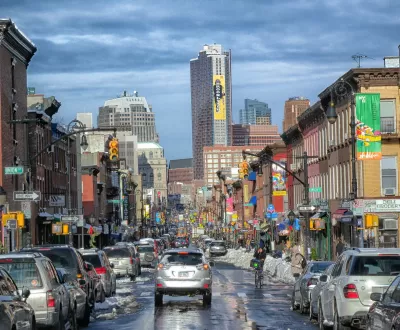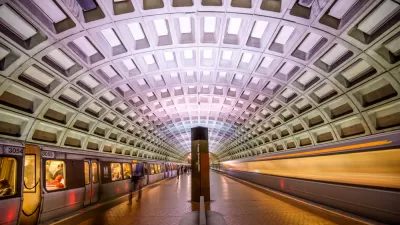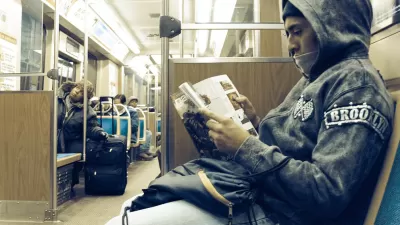Is inadequate infrastructure a reason to keep new housing out of cities?

Two months ago, I blogged about the common argument that cities shouldn’t allow new housing because new residents might overload their infrastructure. I raised a variety of counterarguments, but it seems to me that one point deserves more attention than I gave it.
In particular: there is almost no place in the United States where new residents don’t affect infrastructure needs to some extent. For example, in a city with decent public transit, new residents will mean more people on the subways and buses. So anti-housing activists can plausibly complain that new residents will overload the trains and buses. Even though it is not technically correct (even in New York City) that trains and buses have as many passengers as they can handle, it is true that more riders mean more people sitting next to you, or maybe even a higher likelihood that you may have to stand on the train or bus.
But in a city or suburb that is highly dependent on roads and highways, new residents might mean more cars on the roads and thus more traffic congestion. So therefore, it could be plausibly argued that nothing should also be built in automobile-dependent suburbs.
And we can’t avoid the problem by building in rural land. In fact, new housing in rural areas might require even more infrastructural improvements than new housing in existing suburbs, because rural areas often lack sewers, and often have two-lane roads instead of major highways. So new subdivisions in rural areas might require even more significant infrastructure improvements than new subdivisions in suburbs.
Transportation infrastructure is just one type of infrastructure. Schools are another type of infrastructure that is affected heavily by growth; new residents mean more children in the schools, and thus risk making schools overcrowded if they aren’t overcrowded already.*
So the "infrastructure" argument against new housing is one that suggests no housing should be built anywhere—obviously an absurd result.
It seems to me that a fairly significant body of commentary suggests that sprawl creates more need for new infrastructure than does development in existing areas: for example, if government permits a new low-density suburb in the country, it might build new roads and sewer pipes that might not be necessary if housing is built in existing areas. So if our only goal was to limit the need for new infrastructure, we would limit new housing to already-built-up areas.
But the current zoning system promotes the opposite result. Here's why: if neighbors are given veto power over new housing (as is often the case), we may actually need more infrastructure than if the free market held sway. Why? Because if new housing is built in low-density rural areas, there will be fewer neighbors around to object. Thus, a region where neighbors are given veto power is one which has more housing in cornfields and less housing in cities and existing suburbs, which in turn means that society’s collective infrastructure bill will be larger.
In sum, anti-housing policies never really reduce society-wide infrastructure costs; at best, they shift those costs to more permissive jurisdictions.
*If anti-housing activists really believed that school overcrowding was the only reason to oppose new housing, they would support housing targeted towards single people instead of families—for example, small apartments. But in general, apartments are even more politically radioactive than houses. So I suspect that concerns over schools are either a) not really a major reason for anti-housing activism or b) insincere.

Alabama: Trump Terminates Settlements for Black Communities Harmed By Raw Sewage
Trump deemed the landmark civil rights agreement “illegal DEI and environmental justice policy.”

Study: Maui’s Plan to Convert Vacation Rentals to Long-Term Housing Could Cause Nearly $1 Billion Economic Loss
The plan would reduce visitor accommodation by 25% resulting in 1,900 jobs lost.

Planetizen Federal Action Tracker
A weekly monitor of how Trump’s orders and actions are impacting planners and planning in America.

Wind Energy on the Rise Despite Federal Policy Reversal
The Trump administration is revoking federal support for renewable energy, but demand for new projects continues unabated.

Passengers Flock to Caltrain After Electrification
The new electric trains are running faster and more reliably, leading to strong ridership growth on the Bay Area rail system.

Texas Churches Rally Behind ‘Yes in God’s Back Yard’ Legislation
Religious leaders want the state to reduce zoning regulations to streamline leasing church-owned land to housing developers.
Urban Design for Planners 1: Software Tools
This six-course series explores essential urban design concepts using open source software and equips planners with the tools they need to participate fully in the urban design process.
Planning for Universal Design
Learn the tools for implementing Universal Design in planning regulations.
Caltrans
Smith Gee Studio
Institute for Housing and Urban Development Studies (IHS)
City of Grandview
Harvard GSD Executive Education
Toledo-Lucas County Plan Commissions
Salt Lake City
NYU Wagner Graduate School of Public Service





























